Sandgaard Goes Green
-Towards a sustainable future
Everyday at Sandgaard we work to create a more sustainable future in our supply chians, and in the fashion industry in general.
We have set ambitious goals, ten-year plan and every year we launch new initiatives to become even more sustainable.
We want to be a front leader
Although the fashion industry is far from sustainable today, we are facing better times. Major changes require structure and action among everyone in the supplier chain if the fashion industry is to get better.
We have set an ambitious plan, where fashion and sustainable walk hand in hand
Our effort take place under the name ”Go Green with Sandgaard”, and we will continiously tell about projects and new initiatives.
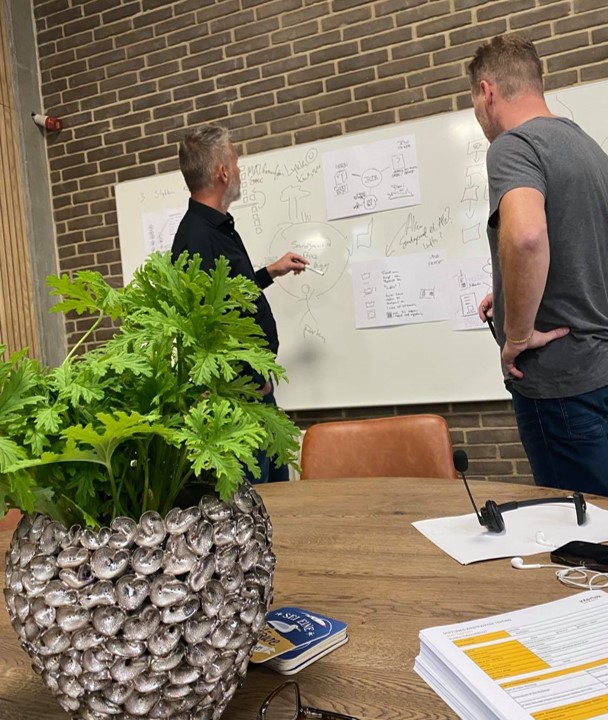
Vision
”Our vision is to support sustainable development, which not only affects the workflow at Sandgaard, but also supports a new movement towards a more circular, sustainable and “body-normative” fashion industry.”
Lars Sandgaard
Sustainability – “a use of the earth’s resources that creates a balance between utilization and protection, so that we do not destroy our livelihoods”
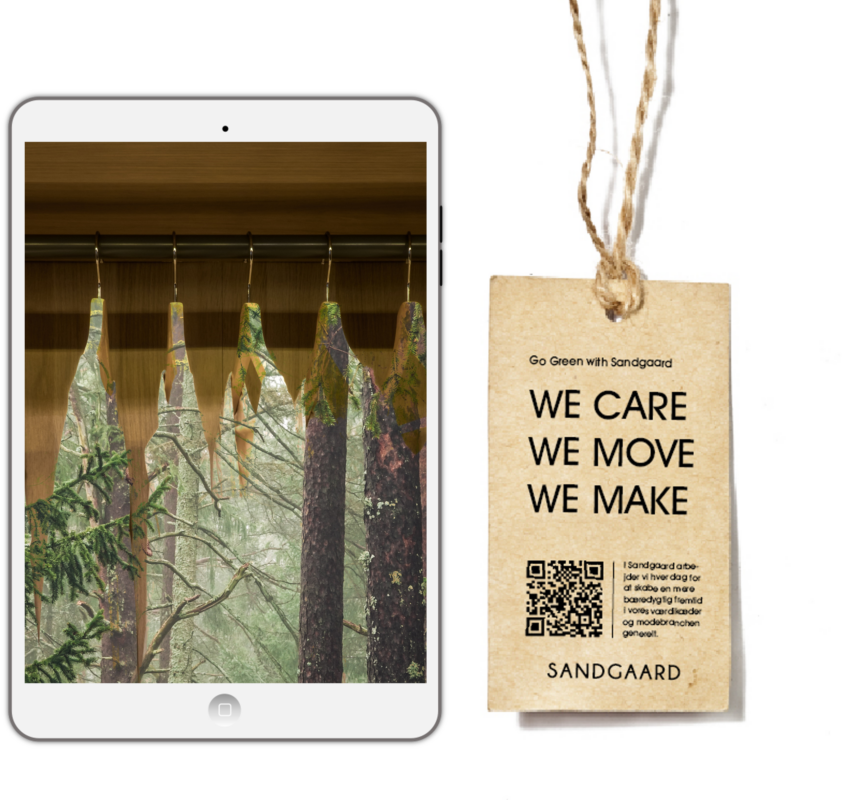
online info and hangtag
In future, our customers will be able to follow both small and large sustainable initiatives at Sandgaard. We have created a Hangtag which can lead customers to washing instructions and our initiatives
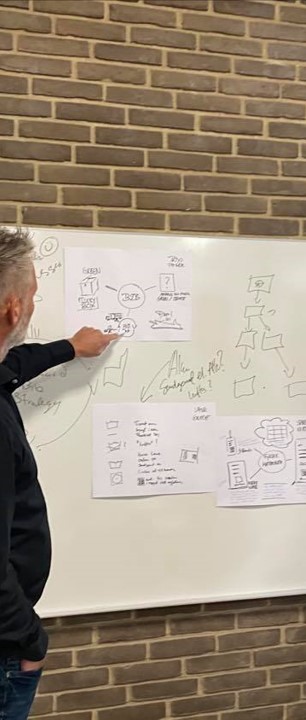
our goals
We want to contribute to a transformation of the fashion industry into a circular future. That is why we have set ambitious goals for the next 10 years, which include:
- Our entire value chain must only use renewable energy. At Sandgaard, we will compensate or establish renewable energy plants that make the entire production of our value chain “sustainable” in the field of energy.
- There must be no waste in our value chain. We want to ensure that there is no waste or waste at ourselves and dealers. In addition, we will fight to establish recycling companies for textiles, so that textile fibers in production and among end users can be recycled 100%.
- We want to give women the freedom to feel safe and express their own identity. Women are different, have different shapes and are in different phases of their lives. We want to give women the ultimate opportunity to be themselves and give them the clothes that make it possible.
You can see more of our objectives on water, transport, packaging, social fairness, etc. on our roadmap on our website.
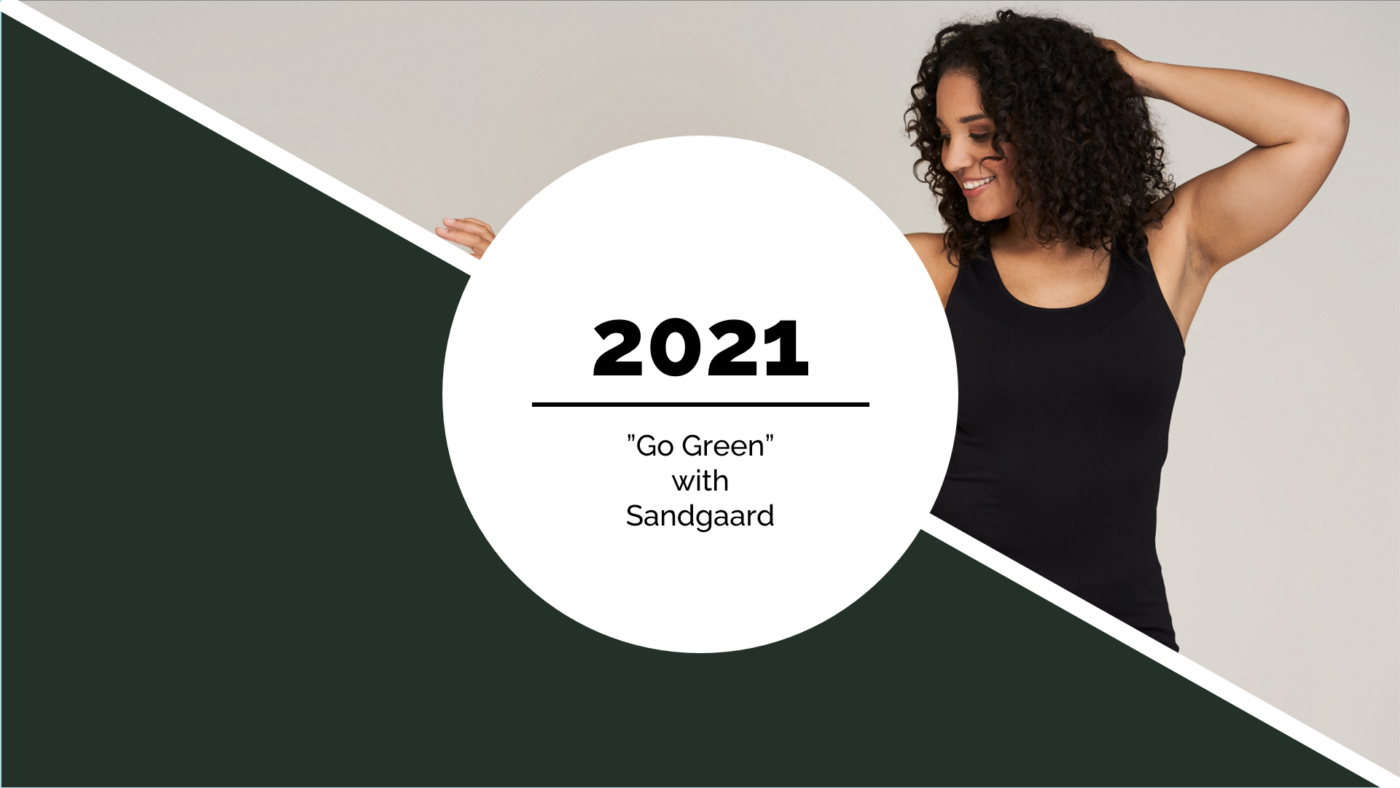
2021 was the start of a comprehensive sustainability strategy
In Sandgaard, we have embarked on a sustainability journey that goes far beyond the ordinary. We invite our customers to look over our shoulders so they can become wiser about what we do to become that. Maybe we can even inspire them to make sustainable choices themselves. In 2021, we have:
- Established ambitious roadmap for the next 10 years
- Initiated energy-reducing and renewable energy projects that make energy consumption at own facilities 100% renewable
- Established Zero Waste set-up for clothes in our own organization and for our dealers
- Initiated recycling scheme for cardboard packaging, which ensures that 70% of all cardboard packaging is reused. The rest is recycled.
- Initiated big-data activities to understand female forms and produced the ultimate comfortable jeans for women that they go with until they are worn out
- Prepared life-extending guide for washing and handling our clothes
- Developed concept for body-normativity
- The first biodegradable product has been ordered and certification has been initiated
In the following, we will elaborate on our initiatives
FACTS
- Production of 1 Cotton T-shirt – requires 1400 liters of clean water, and approx. 10 Kg Co2
- Production of 1 pair of Jeans – requires 10,000 Liters of water, and 40 Kg Co2
- Textile production accounts for about 10% of the world’s CO2 emissions, and is one of the biggest sinners
- We make here in the house approx. 270-300,000 pieces of clothing, emitting between 4 to 4.5 Mio Ton of Co2
- At the same amounts, approximately 450 Million liters of water are used
- We use about 22 tons of cardboard annually
- We use about 5.5 tons of plastic annually
- We use 17 / 18,000 Kwh Electricity annually
- We use 17 / 18,000 Kwh Heat annually
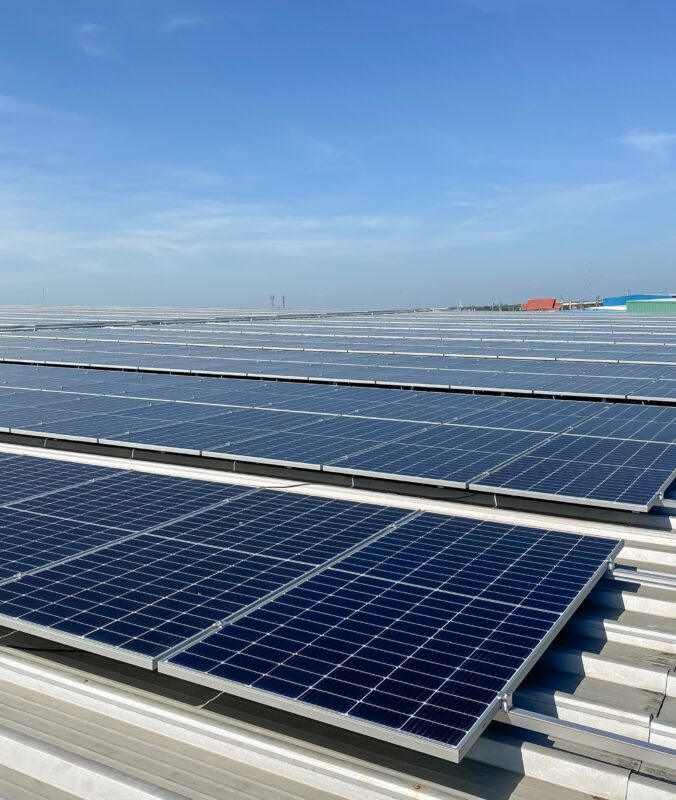
Solar cells must make our facilities energy-positive
We are setting up solar cells on our roof as part of our efforts to become CO2 neutral. We take an extra step and make our facilities energy positive. This means that we produce more energy than we ourselves consume.
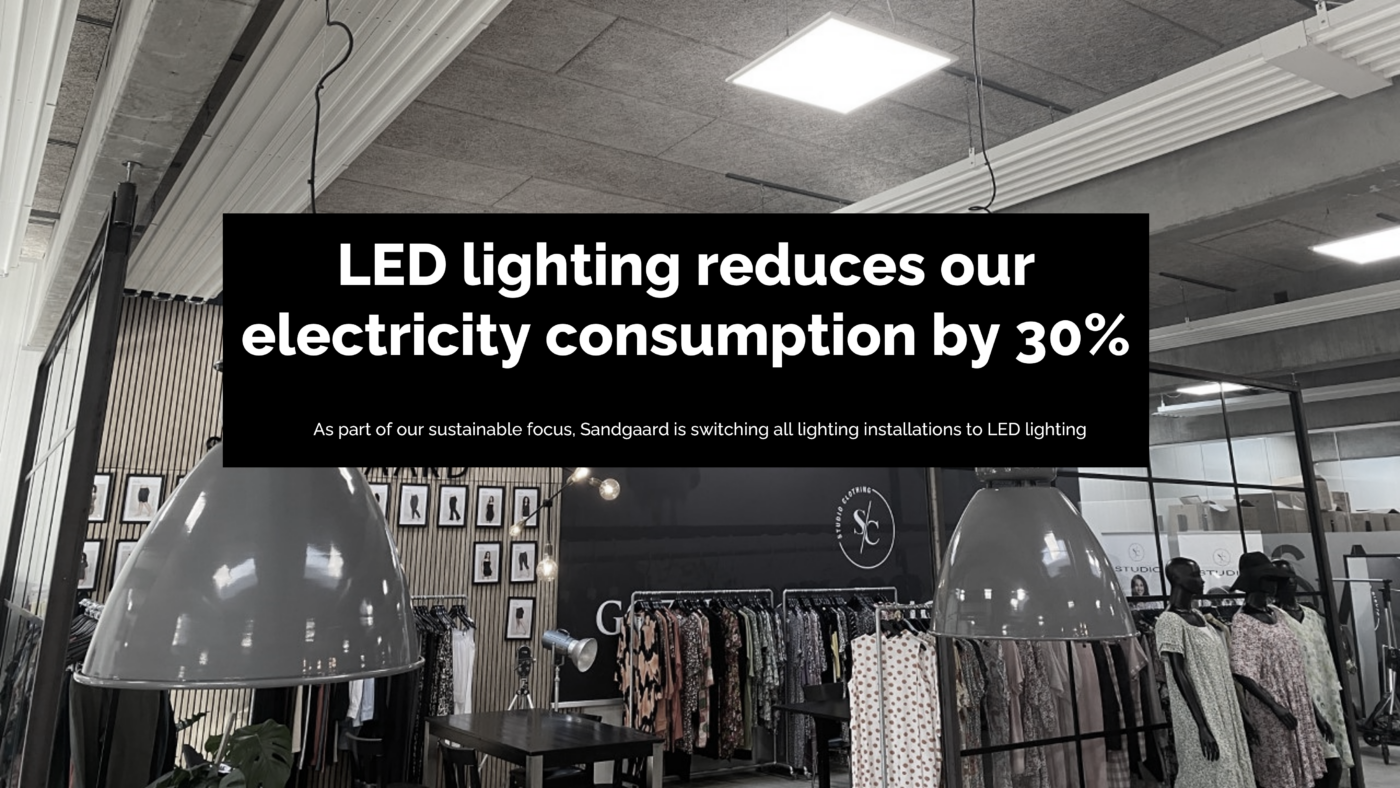
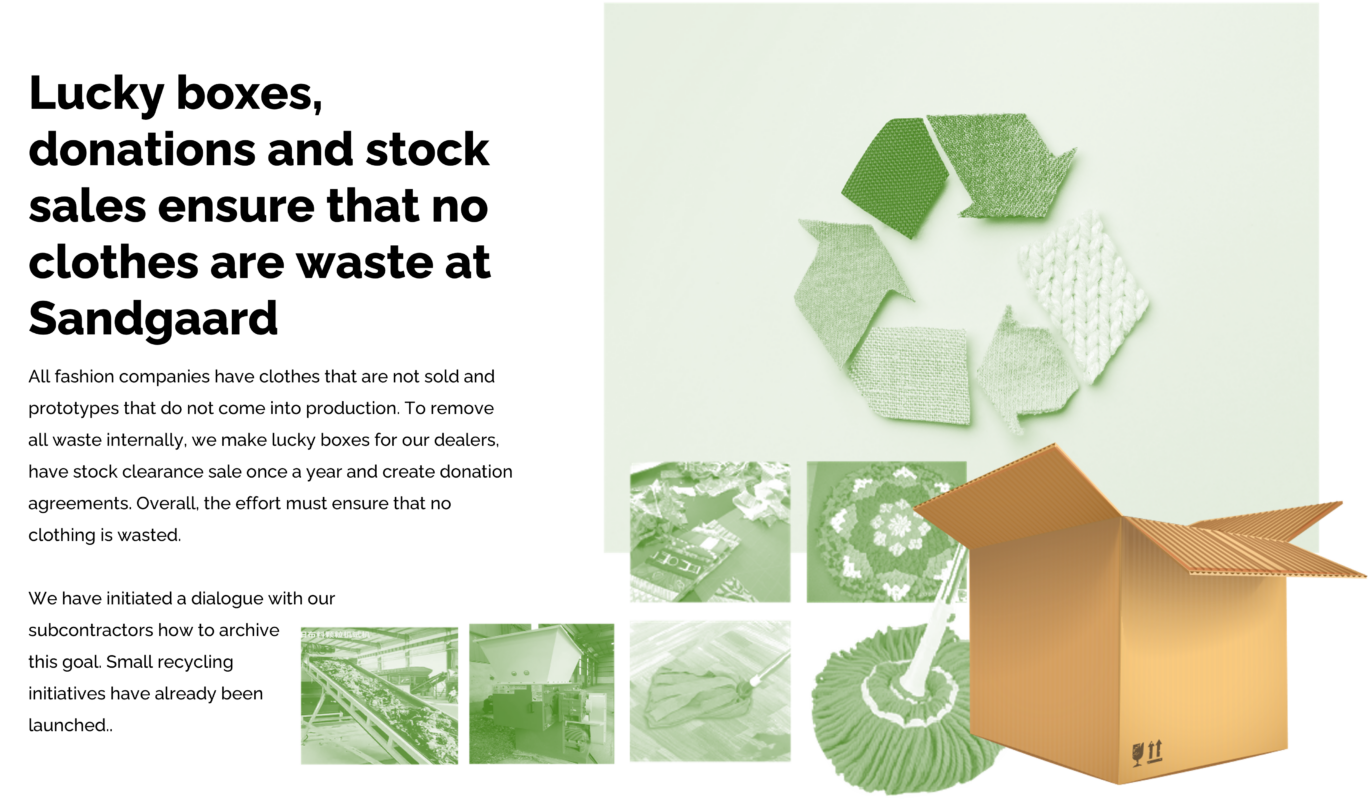
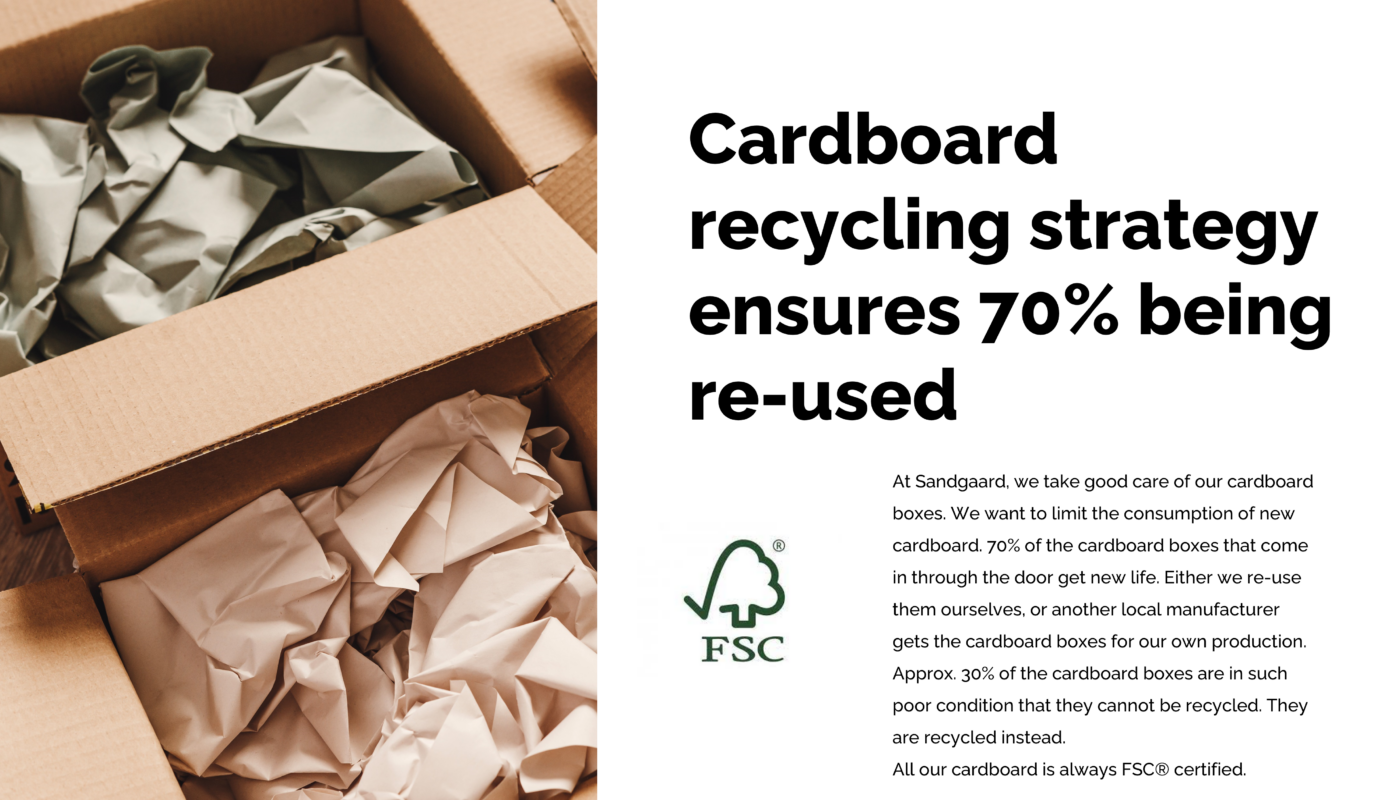
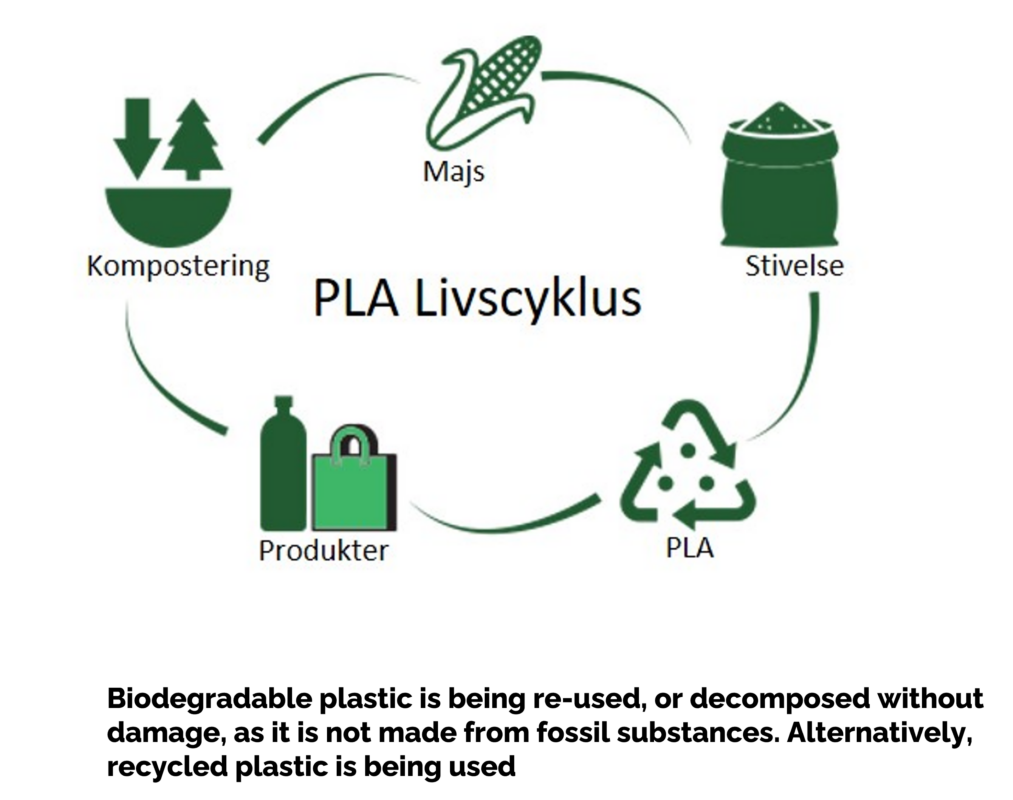
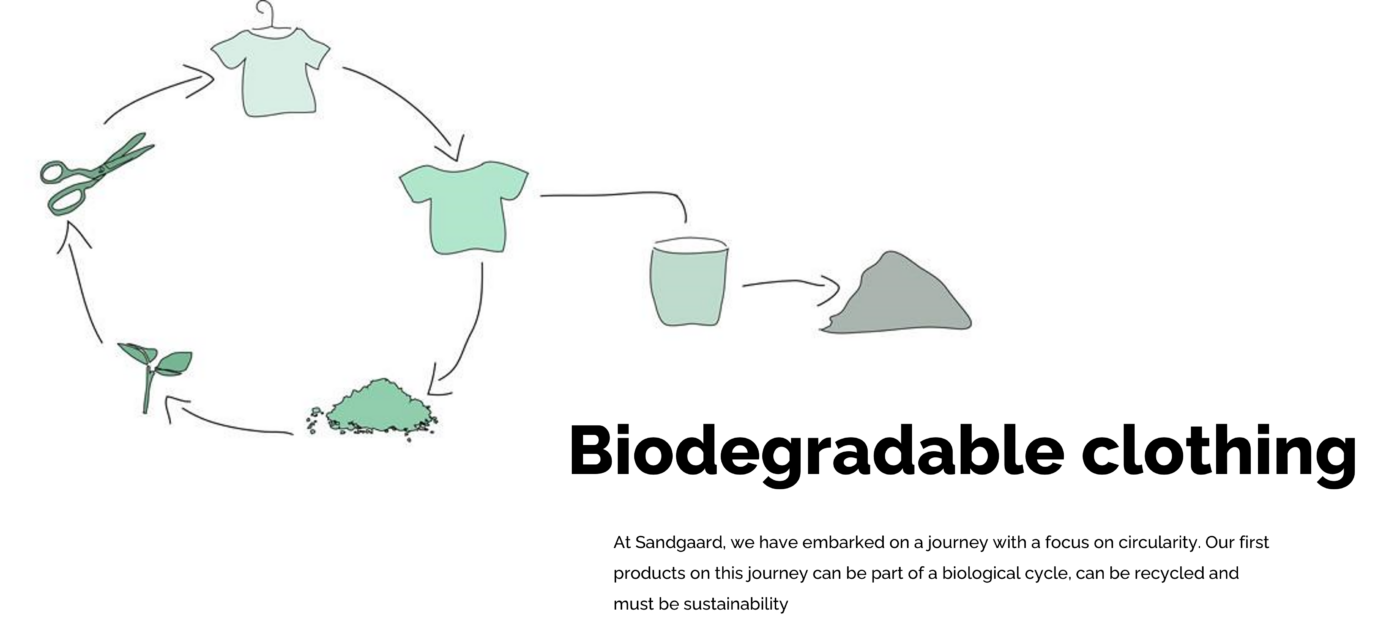
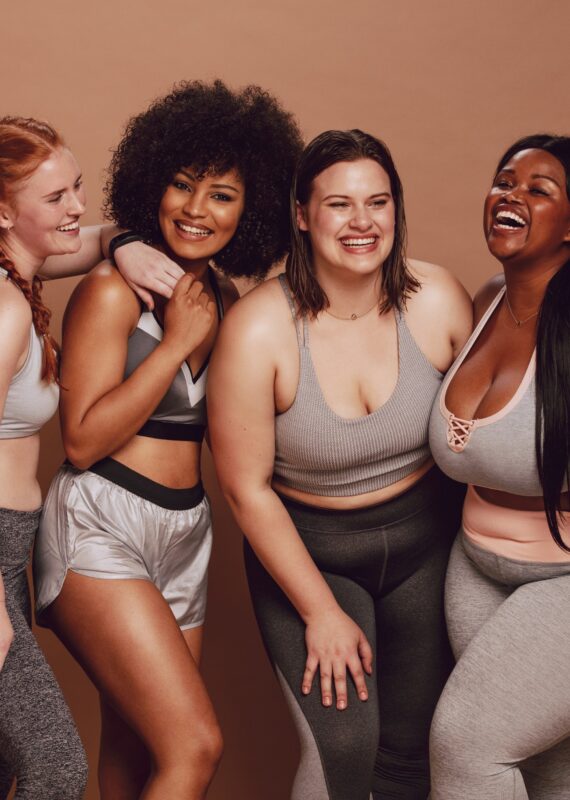
Normy by SANDGAARD
– a daily struggle for body normativity
At Sandgard, we fight every day to bring a new normal into the fashion industry with a focus on the fact that the normal is the diversity of bodies. We need to point out that bodies are different, look different and are in different phases of life.We have launched a big big data project to better understand women’s bodies and shapes. Thus, we can start the work of creating clothes that are made for women – and not the illusion of women.
Proper washing is life-prolonging


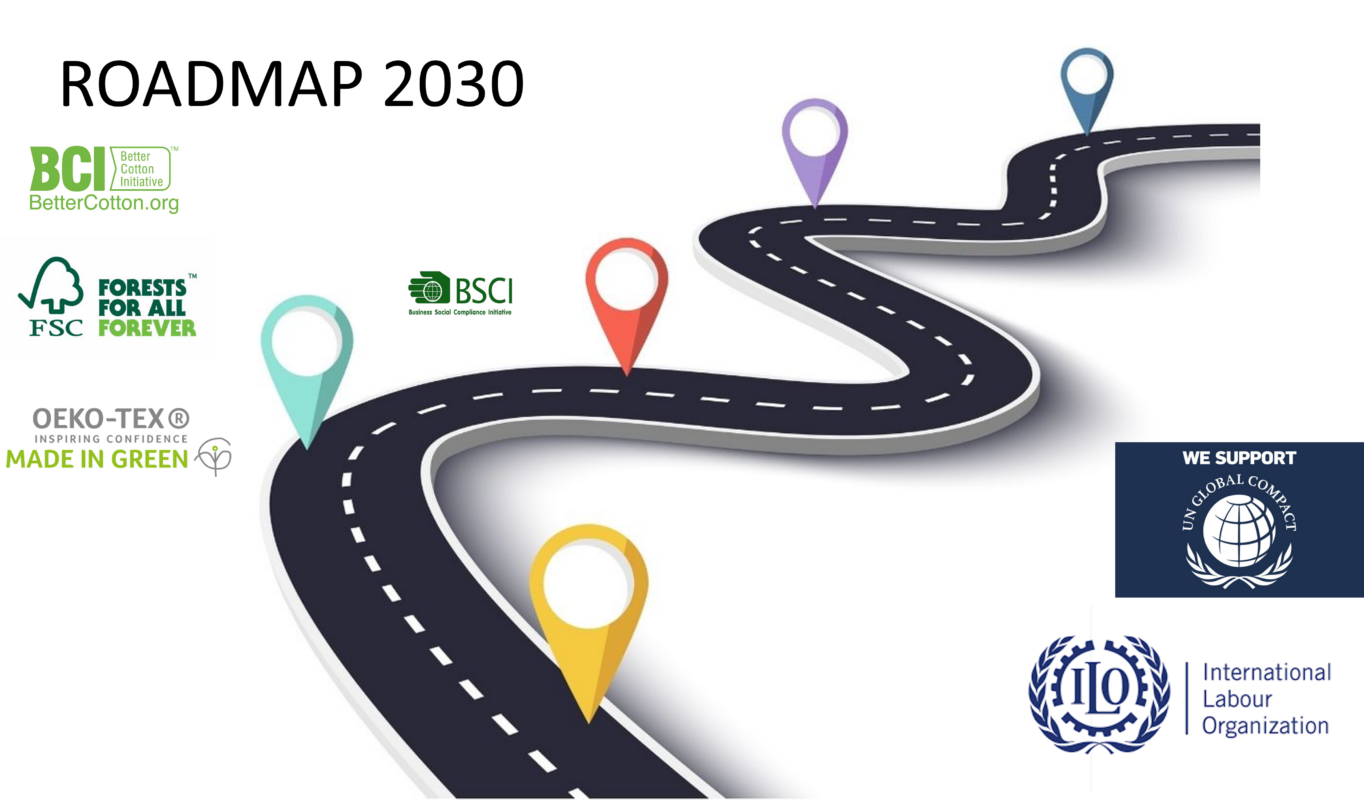

2021
Clothes Waste – No clothes thrown away. Lucky boxes, donations, exchanges, clearance sale
Clean Energy – We switch to 100% LED lighting at our own facilities
Clean Water – We check the municipal connection to the treatment plant on the building
Material Health
Packaging – We re-use 70% of our cardboard, and recycle the remaining 30%
Social Responsibility – We develop body normativity jeans based on “big data”
Transport

2022
Clothing Waste – We briefly outline the possibility of reuse and recycling for the consumer
Clean Energy – We install clean energy at our own facilities and make them Co2 Neutral
Clean Water – We require documented water purification from the subcontractors
Material Health – We certify the first product with documentation of product health
Packaging – We prepare a structure for recycling plastic material at the consumer
Social Responsibility – We adhere to the Global Compact and the 17 principles
Transport – We order transport with sustainable fuels if possible

2023
Clothing Waste – We establish recycling system for our customers
Clean Energy –
Clean water –
Material Health –
Packaging –
Social Responsibility – We support projects within body normativity
Transport –

2024
Clothing Waste – We initiate cooperation with recycling companies, which enables the recycling of clothing
Clean Energy –
Clean Water – Rainwater is recycled and fascines are implemented with the municipality
Material Health – 5 product groups have certification as ensuring the health of the product
Packaging – We create a recycling system that ensures recycling of 80% of our daily waste
Social Responsibility – We support projects within body normativity
Transport –

2025
Clothing Waste –
Clean Energy – We invest in renewable energy projects that compensate for our value chain’s consumption, so we remain CO2 neutral
Clean Water –
Material Health –
Packaging –All packaging and residual material is reused or recycled
Social Responsibility –
Transport – We inform our subcontractors about our upcoming sustainable transportation needs

2026
Clothing Waste – The first recycling project must be completed
Clean Energy –
Clean Water –
Material Health –
Packaging –
Social Responsibility – We are frontrunners for body normativity
Transport –

2027
Clothing Waste –
Clean Energy –
Clean Water – Our entire value chain has 3rd party verification of water purification
Material Health – Half of our products have certification
Packaging –
Social Responsibility – All parties in the supply chain comply with ILO guidelines – 3-party verification (International Labor Organization)
Transport –

2028/2029
The whole of 2028 and 2029 will be follow-up and efforts to achieve the last goals for 2030, and at the same time comply with the requirements that may not have been met in previous years.

2030
Clothing Waste – Everything is recycled or reused. However, we have residual fractions
Clean Energy – We ourselves and the supply chain Co2 Neutral or Co2 are positive
Clean Water – Our entire value chain has 3rd party verification of water purification
Material Health – All our products have certification that documents the health of our products
Packaging – All packaging is reused or recycled throughout the supply chain
Social Responsibility –All parties in the supply chain comply with ILO guidelines – 3-party verification (International Labor Organization)
Transport – We strive for all transport to take place with sustainable fuels
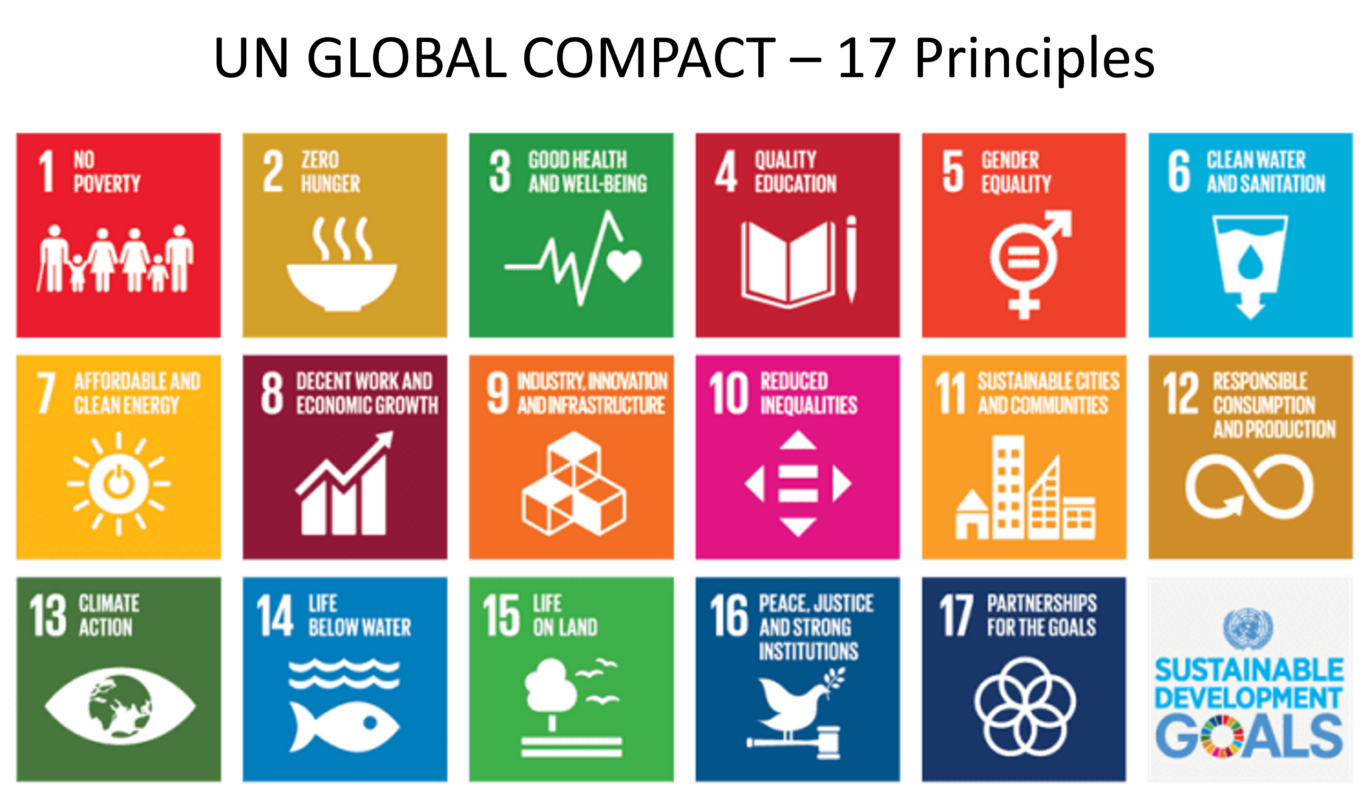
WE SUPPORT

Plastic Change
We support Plastic change, in changing the world. Plastic Change focuses on reducing plastic waste and pollution. At SANDGAARD A/S is working towards to recycle all our textiles and packaging.
WE ARE A PART OF

UN GLOBAL COMPACT NETWORK DENMARK
As part of our “Go Green With Sandgaard” we have joined Un Global Compact Network Denmark, to participate in reporting our sustainability journey in fashion and textile industry.


